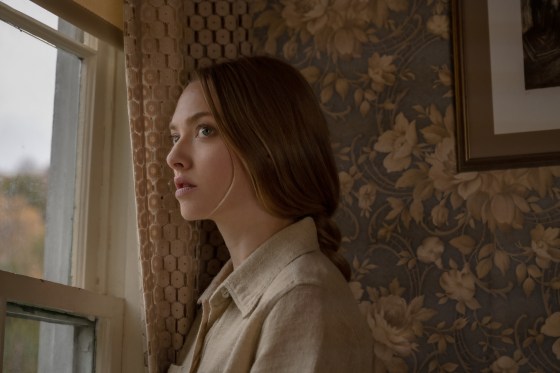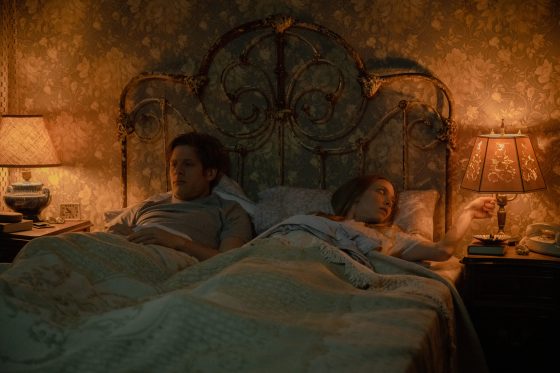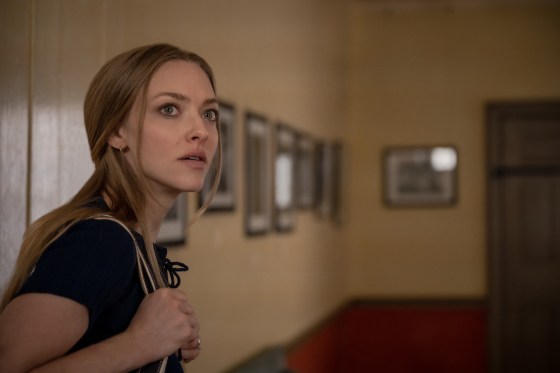Within the first few minutes of the new Netflix film Things Heard & Seen, it’s clear something has gone very wrong. A man (James Norton) is seen pulling into the garage of an old home in the countryside. As he cuts the ignition on his car, a red droplet appears from above, falling onto his dashboard. He exits the car, looks up, sees liquid seeping through the floorboards and rushes inside the house, where a young girl is expectantly waiting for him. He scoops her up in his arms, and begins to run.
What happened in that house? That question is at the center of Things Heard & Seen, which then rewinds to the previous spring and unpacks all that led up to this mysterious moment. The ‘80s-set thriller, which drops on the streaming platform on April 29, follows a young family—Catherine Clare (Amanda Seyfried), her husband George (Norton) and their daughter Franny (Ana Sophia Heger)—as they relocate from Manhattan to the Hudson Valley north of the city, where George has just landed a teaching position at a nearby college. The Clares move into an old dairy farm with a complicated history—one that George failed to mention to his wife when they purchased it.
From there, things get messy. George is quick to start building their new lives around his art history career while Catherine feels increasingly cut off from the rest of the world. In the house, she begins to notice strange and creepy artifacts, which leads her on a journey to figure out the property’s past and the brutalities that took place there. The movie is based on Elizabeth Brundage’s 2016 book All Things Cease to Appear and is directed by the married filmmaker team Shari Springer Berman and Robert Pulcini. In an interview with Netflix, Springer Berman said that she was drawn to the story because of Brundage’s ability to depict the realities of a marriage alongside the supernatural elements of the farm house. “It was creepy and frightening and engaging and also beautifully written and extremely literary with beautiful character descriptions,” she said. “It looked in a very honest way at the terror and the beauty of a marriage.”
Here’s what you need to know about the origins of Things Heard & Seen, from Brundage’s novel to the real-life murder that inspired the story.
(Spoilers ahead for All Things Cease to Appear and Things Heard & Seen)
What to know about All Things Cease to Appear
While both the book and movie have the same premise, there are key differences in their structures. The novel begins on more explicit terms: Catherine is dead, George has just arrived on his neighbor’s doorstep with Franny in tow, and he becomes the primary suspect in her murder. Brundage introduces flashbacks that reveal the fissures in the Clares’ marriage—a tension that isn’t made clear in the film until later on. Brundage flips between timelines as she unveils the tragedies that came before them in the house they moved into in upstate New York.

When the book debuted in 2016, Brundage was praised for elevating a standard thriller plot into something more. TIME’s review of the book applauded the author’s literary skills: “Brundage’s language is the real draw, with her vivid portraits of spouses on opposite sides of a brutal abyss.” In his review for The Wall Street Journal, Tom Nolan appreciated how the book was not easily categorized. “Is the book a ‘police procedural?’ In part. A ‘gothic mystery?’ Incidentally. A novel of ‘psychological suspense?’ In spades,” Nolan wrote.
Beyond providing more concrete details in the beginning of the narrative, Brundage also includes more context about the history of the home as well as the impact of Catherine’s murder on her daughter’s life. The last section of All Things Cease to Appear is set decades in the future, in 2004, where Franny is a third-year surgical resident going through the motions. She receives a phone call that she has to return home because the farm has finally been sold. “When she was a child her questions were ignored, and even now, as an adult they’ve never been answered,” Brundage wrote. “Nobody on her father’s side talks about her mother.” By the novel’s end, Franny is left longing for the mother she never got to know and is disturbed by how much she doesn’t remember about the life they once shared together.
The book is loosely based on a true story
The inspiration for All Things Cease to Appear comes from the time Brundage spent living in upstate New York with her young family. Her husband had recently joined a local medical practice and she happened upon an old home for rent, which she was so struck by that the family decided to sign a lease, according to Brundage’s website. But they soon “discovered that we were not alone” when Brundage’s daughters, at just three and six years old, began telling stories about ghosts that lived in the house, specifically three girls who died in a fire there. “They knew details that seemed beyond their ability to fabricate, including the names of the ghosts, and historic details about an old mill down the road with tainted water,” Brundage wrote. “One night, my youngest was literally laughing at something that seemed to be moving around the room. She pointed at it, giggling, I couldn’t see it. But I could feel it, I just knew.”

After moving in, a neighbor warned Brundage that the house was haunted and its last owner moved away as a result. “On Halloween, I turned on my computer and the printer started printing out a skeleton head made up of the word Boo. This was before the Internet—the only thing running through the computer was electricity,” Brundage said in an interview with Mom Advice. As spooky instances began to mount, the author found herself reconsidering how she thought about ghosts. “Unlike the usual stuff of horror movies, the experience sort of opened me up to the possibilities of ghosts as haunted souls rather than monstrous forces of evil,” she told the Book Trail in 2016.
Those experiences ended up shaping All Things Cease to Appear, which was also inspired by the 1982 murder of Cathleen Krauseneck, a woman who was found dead in her bedroom with an ax in her head while her 3-year-old daughter was alive elsewhere in the house. Brundage recently told Democrat & Chronicle that the disturbing details of the killing stuck with her: “The thing that really motivated me to explore the (homicide) case as the potential architecture for a book were those long hours that this little girl was alone with her mother.”
Making the movie
Directors Springer Berman and Pulcini, who also wrote the screenplay, have a home in the Hudson Valley, and shot the movie there in 2019. “We love the landscape and the history and we are big fans of the Hudson River school of artists,” Pulcini told the Journal News, referring to the group of American landscape painters from the 19th century. “I mean, it is something that we always talked about, what type of movie would we film here.” The rural landscape provides an eerie backdrop for Things Heard & Seen, which joins a slate of movies and television shows filmed in the region, including parts of the HBO miniseries The Undoing and John Krasinski’s 2018 film A Quiet Place.

What also stood out to the filmmakers in adapting the book was the feminist bent of the story. Like many stories in classic literature, this one is centered on an isolated woman who is believed by nobody when she expresses concern over the haunted happenings inside her home. “A lot of those books were about female power and the suppression of female power,” Pulcini said. “This was similar, but kind of turned on its head—the supernatural, the house. It has a lot of those Gothic elements you see in Turn of the Screw, but it also did something different, something that I had never seen. It covered new territory.”







0 comments:
Post a Comment